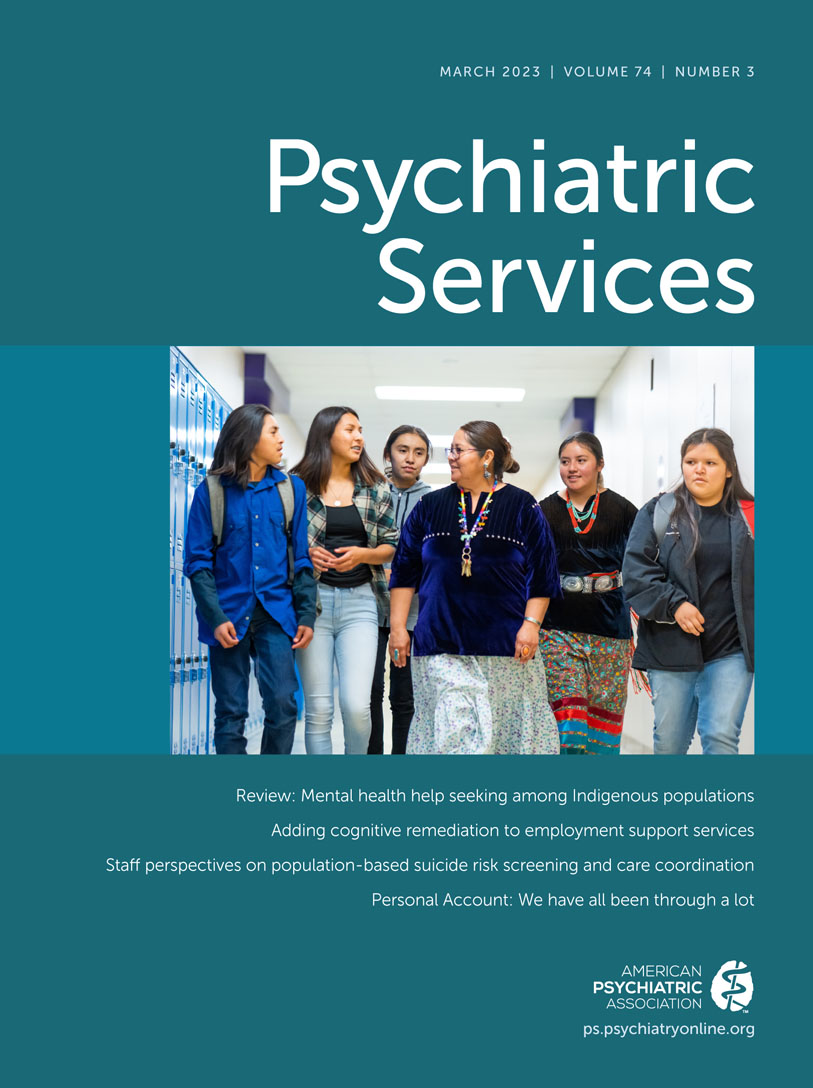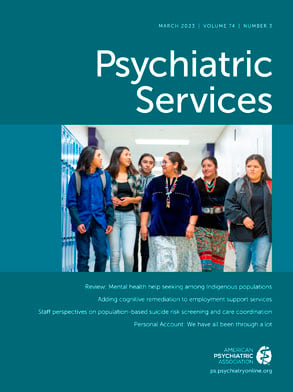Homelessness is a public health problem in the United States, with over a half-million people experiencing housing insecurity; one-third have a mental illness, including comorbid substance abuse. Homeless individuals have experienced trauma and have limited resources and weak social networks, which have associations with chronic learned helplessness and sustained fear and mistrust of persons of authority and health care providers. These factors result in disenfranchisement from long-term outpatient psychiatric care and are associated with high mortality rates.
In a rapid review in this issue, Erickson and colleagues (
1) creatively consider how to prescribe psychiatric medication in street psychiatric settings, where no formal guidelines exist. The authors offer a set of biomedical strategies developed “bottom up” by community psychiatric prescribers to address the challenge of prescribing psychiatric medication to individuals with psychiatric symptoms and unknown medical histories. However, most of these approaches are related to clinical decision making and focus on the dilemmas that prescribers experience and the data that prescribers need for decisions. This prescriber focus could be enriched by the patient’s perspective. In addition, the high rate of substance use among those with home insecurity increases the challenges and risk taking among both prescribers and patients, including prescriber liability, treatment disengagement or inconsistency, and even death. Therefore, prescriptions in street settings warrant further consideration. For example, why are so few studies focused on low-threshold prescribing? The authors posit that pragmatic studies have not yet been conducted and are needed for real-world settings. However, an alternative consideration is that assessing efficacy and outcomes of psychotropic prescribing is inherently difficult in low-threshold settings and thus may have little bearing on the trajectory of care. Because the studies in the review focus primarily on the domains of safety and treatment duration, the assessment of longitudinal impact is minimal and inherently limited to symptom improvement. This narrow view does not acknowledge the extensive literature about therapeutic alliance building and the impact of collaborative approaches on treatment outcomes.
Collaborative and person-centered approaches aim to increase the involvement of those affected by mental illness in the choice and management of their psychiatric treatment and services. Collaborative approaches help to develop more holistic care and provide psychosocial supports driven by the patient’s preferences and values and the clinician’s shared risk. Such collaboration includes pharmacological and nonclinical social services and supports such as housing and employment. Known collaborative approaches include shared decision making (SDM), social prescribing, and development of psychiatric advance directives. The motto “no decision about me without me” is the essence of every collaborative person-centered approach, which is underscored in current emerging practice guidelines of low-threshold street psychiatry prescription.
SDM, in particular, values the subjective experience of psychiatric distress over a set of symptoms and a list of diagnoses. The shift in traditional psychiatric care offered via SDM is suitable for street psychiatry with individuals experiencing homelessness. Building mutual trust, a core principle of SDM, is critical in providing psychiatric care for those who lack trust in the system. SDM helps equalize the power asymmetry between prescribers and patients, which helps people with lived experience of mental issues and homelessness to share more about themselves, which in turn can improve the prescription of psychiatric medications and referral to nonclinical services, also known as social prescribing.
Evidence has highlighted the benefit of therapeutic alliance building and SDM approaches to improve psychiatric services delivery. Further research and development of guidelines, resources, interventions, and tools to initiate and engage in SDM are more pressing than additional studies to address low-threshold prescribing. With the ongoing debates on the risks, benefits, and relevancy of psychiatric medications, we propose that a planned investment in research to encourage collaborative prescribing is needed and preferred to a narrow focus on the prescription of low-dose psychiatric medications. From a policy perspective, although focusing on medication prescription is the easier path, it is overshadowed by the unresolved and far more complex issue of homelessness and mental health.

